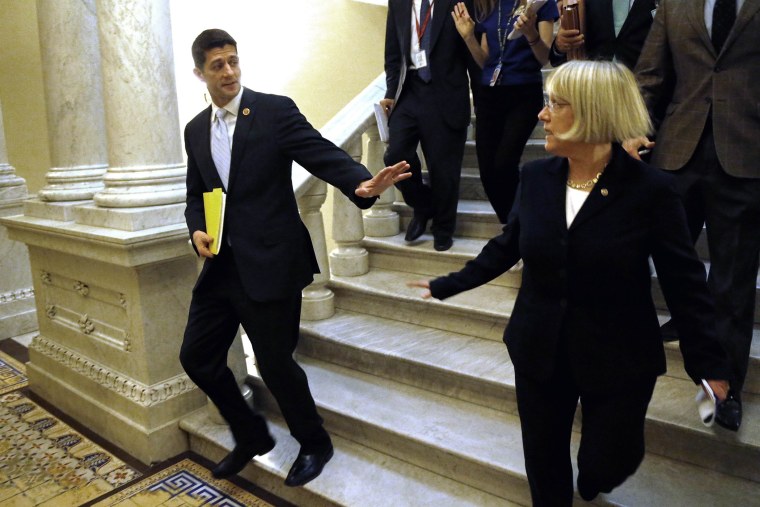We've grown so accustomed to congressional failure that the bipartisan budget deal seems rather extraordinary. The agreement, negotiated by House Budget Committee Chairman Paul Ryan (R-Wis.) and Senate Budget Committee Chairwoman Patty Murray (D-Wash.), sets spending levels for the next two years, and passed the Senate last night after having cleared the House last week.
In an odd twist, House Republicans were more amenable to the deal than Senate Republicans -- while most GOP House members backed the budget deal in a vote last week, all but nine GOP senators opposed the agreement last night.
There's no shortage of angles to this, including the realization that we almost certainly won't see another government shutdown for a while, but perhaps the most important question is, if lawmakers can strike a bipartisan budget deal, isn't the door now open to progress elsewhere?
After all, for three years, many have worked under the assumption that far-right activists exercise a de facto veto power over Washington policymaking -- if the Republicans' activist base disapproves of an idea, it dies, regardless of merit. But this month, GOP leaders effectively blew off the "professional right" -- indeed, House Speaker John Boehner rebuked conservatives in unusually forceful terms -- offering new hope that governing might still be possible.
I'm afraid, however, that skepticism is still warranted. As Ezra Klein explained late yesterday, the budget deal shows "there are ways in which the two parties can work together. But only when they don't have to compromise."
Rep. Paul Ryan (R-Wis.) said so himself at the news conference announcing the agreement. "From the outset, we knew that if we forced each other to compromise a core principle we would get nowhere," he said. "That is why we decided to focus on where the common ground is." That meant no taxes. It meant no changes to Medicare, Social Security, or Medicaid. It meant letting unemployment insurance expire. It meant doing nothing about crumbling infrastructure or Obamacare. It meant leaving most of sequestration in place.
It may seem heartening when anything passes Congress with bipartisan support, but the budget deal is fairly narrow -- which is ultimately why it succeeded with minimal fuss. It just didn't ask too much of either side.
But if Boehner was willing to thumb his nose at Heritage Action, the Koch brothers, FreedomWorks, et al, on the budget, and he lived to tell the tale, maybe he'll do it again? After all, there's some popular and worthwhile legislation awaiting House action -- immigration reform, ENDA, etc. -- and all the Speaker has to do is schedule some floor votes and let the House work its will.
Even now, however, the odds are against it. The Ryan/Murray agreement worked largely because Republicans didn't have to concede much. Heck, in their private moments, many GOP lawmakers concede they don't much like the sequestration policy anyway, and they can continue to go after the Affordable Care Act in other venues.
Every other major piece of pending legislation, however, requires Republicans to accept policy provisions they actively dislike -- and this is a group that believes "compromise" means "getting my way."
On the budget, Boehner & Co. didn't want another shutdown, so they embraced a modest agreement. On everything else, GOP lawmakers see failure as an option.
The bipartisan cooperation that led to the budget deal could serve as a framework for other breakthroughs, but in all likelihood, it won't.
